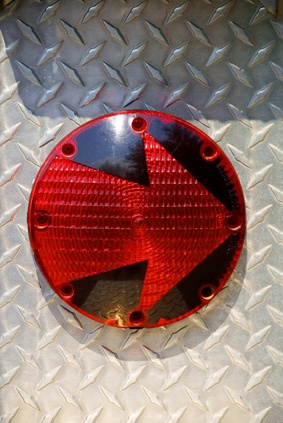
Tail lights, turn signals, hazard lights and brakes use separate bulbs but often are powered by similar fuses, relays and wiring.
Bulbs can burn out, causing the turn signal to malfunction. Check each bulb independently and replace any burned-out bulbs.

Fuses can go bad, causing one of your vehicle's lights to malfunction. Ensure that your fuses are functioning by checking each light individually. If one does not light, change the fuse that corresponds with that light.

The wiring to your lights can become corroded, causing the lights to malfunction. Check the wiring to each light and look for corrosion. If two wires are corroded and are touching, one will cancel the other when in use; in this case, the brake would override the turn signal. The wiring will need to be replaced.

The relay for the blinker, which works the hazards and turn signals, can go bad, causing a solid light rather than a blinking light. Replace the relay.